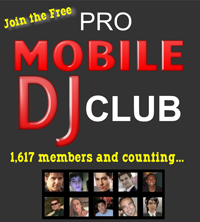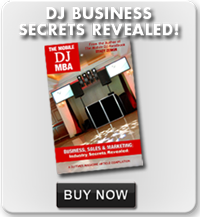By Jerry Bazata
Understanding the risk of sharing your music with others could prevent you from making a terrible mistake that costs you your business.
The fact is that there are laws that protect artists, record labels and music subscription services. They and the RIAA are intent on enforcing them because millions of dollars each year is lost due to piracy and illegal downloads.
According to a Pro Mobile DJ inside source who wished to remain anonymous:
Be warned that these entities are monitoring sites like e-Bay, Craigslist.com and Facebook. And, with the addition of watermarks and coding, it’s becoming increasingly easier to find the source of the leak!”
Example #1
A DJ who is a multi-op business owner buys a single subscription to a music service. He burns copies of the music or shares the files with his DJs to use. Since the DJ has actually purchased a subscription, he has a right to share it, right? WRONG! It’s still illegal whether he gives it away for free or even worse, sells it to them.
Example #2
A DJ is booked to perform at a wedding reception. As a gift to the bride and groom, she burns a CD of the song selections for their special dances. The DJ thinks that this is a great marketing/promotional tool, and she’s not charging anything for the CD, so she’s legally covered, right? WRONG! It’s still illegal, and if the bride and groom happen to also burn those songs for their bridal party, that DJ could be in a lot of trouble.
Example #3
A DJ is looking to make a few extra bucks by copying the music on his hard drive to other external hard drives for sale to other DJs. He legally bought the music and the new hard drives so he has the right to do this, right? WRONG! It’s blatently illegal and the DJ is begging to be caught - especially if he does any kind of advertising about what he’s selling.
Example #4
A DJ creates a unique remix of popular songs, and then gives away copies for free on Facebook, her website and in-person. She prints or includes a message that goes along with the MP3 or CD that say’s “For Promotional Use Only.” She’s giving away her mixes for free, so it’s okay, right? WRONG! It’s still illegal although she won’t be the music industries first target unless she is getting a tremendous amount of hits for her free downloads.
Big Brother is Watching Us
Once again, according to our music industry source:
It should be noted that the people who the RIAA, record companies and music subscription services are most interested in, are those who are selling music vs. giving it away for free. If a DJ is found to be doing this for profit, he will potentially face prosecution and fines, and social networks can terminate his account, destroying years worth of marketing and branding. It’s important to understand that these companies are diligently monitoring social networking sites for inappropriate distribution and publication of artists’ works.
Distribution of music in the manners described above is violating the law, and the resulting fines can be as much as $750.00 per song, per CD. If the person who received the music illegally then duplicates it, the provider can be responsible for thousands of more dollars in fines.”
Important Facts to Keep in Mind:
- The distribution of music that you profit from directly or indirectly is 100% illegal.
- The resale of music that you obtained from a subscription service or any digital or analog music in general, can result in fines that can bankrupt you and your business.
- New technologies embedded in music now allows illegal music pirating to be traced back to the source.
- Offering copies of songs or file sharing anywhere on unlicensed peer to peer networks is a form of illegal distribution.
The Truth is…
LOTS of DJs are buying their music from other DJs. This is akin to purchasing a stolen watch that you know is stolen. It’s a much bigger deal if you are selling something to someone who is already willing to pay for it.
What Is Legal
If you have purchased a song from any legal source, it is legal for you to make a single backup copy of that song for your personal use.
I asked Pro Mobile DJ Publisher, Stacy Zemon, to weigh in on this issue. Here’s what she had to say:
I don’t think that the RIAA or record labels have given mobile DJs nearly enough credit for the role we play in helping to sell music. To add insult to injury, they have remixers on their target lists. I personally do not feel that it should be illegal to create an original work of art — something entirely new out of pre-existing music. The creativity that goes into remixing is an essential party of the DJ world and highly desired by audiences. I do however, think that if a DJ remixer profits from a song, that those profits should be shared with those who hold the original publishing rights to the music.”
The State of the Music Industry
Sobering Statistics just released in a report by IFPI, representing the recording industry worldwide. It stated that the vast majority of content distributed on file-sharing and social networks is copyright infringing, and the availability of content for free is the main driver for online piracy. As a result there is an increasing international trend in the striking decline in both the number and proportion of successful releases globally by new artists. New debut albums have fallen an astonishing 77 percent between 2003 and 2010.
In summary, there are fewer new artists coming to market because their financial incentives are fading. While legitimate music offerings will continue to exist, they are deterred by piracy in one form or another, risking jobs across the creative industry as a whole. Click here to read the full report released by IFPI
What are your thoughts on this subject?
Jerry Bazata – Money Answer Man
Jerry Bazata (Maine’s DJ Jaz) has over 25 years of experience as a professional DJ entertainer. His firm, J & J Marketing and Entertainment, is a leading consultant to the event planning and music industries. Jerry is a published author and is recognized nationally as an authority on the disc jockey business. He is also Senior Vice President of a global financial institution. To learn about Jerry’s DJ company, visit MaineDiscJockey.com and you can email him at [email protected].
![]() Tweet This Post
Tweet This Post









